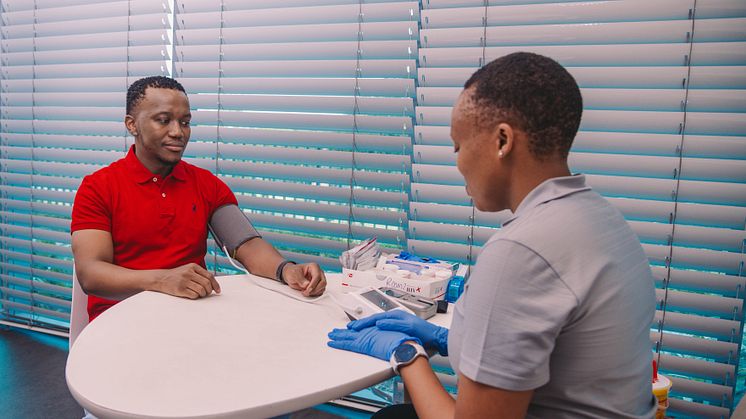
Press release -
Discovery Health Medical Scheme notes an increase in young people diagnosed with chronic high blood pressure (hypertension)
“This World Hypertension Day and May Measure Month, Discovery Health encourages everyone to make regular blood pressure checks a priority,” says Dr Noluthando Nematswerani, Chief Clinical officer at Discovery Health. “Blood pressure checks are a very quick and easy way to know one’s risk of chronic high blood pressure - also called hypertension.”
- ‘May Measure Month’ is a global blood pressure screening awareness campaign launched by the International Society of Hypertension to encourage everyone to go for #TheBigSqueeze – a blood pressure check.
- World Hypertension Day is marked every 17 May, and this year is themed ‘Measure your blood pressure accurately, control it, live longer’.
Hypertension on the rise in young medical scheme members
Hypertension is a major cause of premature death across the world. According to the World Health Organization an estimated 1.28 billion adults aged between 30 and 79 have hypertension. Unfortunately, almost half of these people (46%) are unaware of their condition.
According to Discovery Health Medical Scheme (DHMS) claims data, over the past five years (2019 to 2023), there has been a 22% increase in the prevalence of hypertension in the member base. Hypertension is in fact the top chronic condition noted, with equal incidence and prevalence across males and females.
- 'Prevalence’ refers to the number of people who have or live with a condition, and ‘incidence’ refers to new cases (people diagnosed for the first time), both at a given point in time or over a set interval.
“More than one third of DHMS members over the age of 60 have hypertension. But what’s very concerning is that DHMS claims data also show an increase in hypertension incidence among young members of late. For example, in members aged 25 to 39 we’re seeing an increase in new diagnoses at a rate of 5% per annum, which means a 23% increase from 2019 to 2023,” says Dr Nematswerani. “In 2023, in the 25- to 29-year-old age bracket alone, more than 800 members were newly diagnosed with hypertension which led them to register for the Scheme’s chronic illness benefits.”
Discovery Life’s 2023 claims data (released in April 2024) adds to the picture painted by DHMS data by bringing in the financial impact of heart-related illnesses. Dr Maritha van der Walt, Discovery Life’s Chief Medical Officer adds: “The top life cover claims for most age groups were for cancer and heart and artery related illnesses. Heart and artery conditions were the main cause of death among males (30%) and the second highest cause among females (21%) after cancer. This proves the importance of screening for the risk factors for heart and artery disease, such as hypertension, through checks such as regular blood pressure checks.”
Why is hypertension called a ‘silent’ condition?
“Most people with hypertension don't have any symptoms that something is wrong. Some people have headaches, shortness of breath, dizziness, chest pain, heart palpitations and nose bleeds which they may not always link to chronic high blood pressure. This is why regular blood pressure checks are so important,” says Dr Noluthando Nematswerani, Chief Clinical officer at Discovery Health.
A simple squeeze of the upper arm gives you life-saving information
Checking your blood pressure is quick, easy and inexpensive. This sort of check is usually done by a nurse (at your pharmacy or local clinic) or by your GP. One can also do a self-check at home using a clinically recommended monitor available at most pharmacies.
A blood pressure gauge - a cuff that's placed around the upper arm - gets tighter as it's inflated and released to give you your blood pressure reading.
Blood pressure is measured in millimetres of mercury (mm Hg). The measurement is recorded as two numbers, one "over" another - for example 140/90 mm Hg or ‘140 over 90’. The top number refers to systolic pressure, which is the pressure in your arteries, when your heart contracts and pumps blood out to the organs in the body. The bottom number refers to diastolic pressure, which is the arterial pressure when your heart is resting, between heart beats.
"A normal blood pressure reading is below 120/80 mm Hg," explains Dr Nematswerani.
"Hypertension is usually diagnosed when blood pressure is measured on two different days and either number (or both numbers) are equal to or above 140/90 mm Hg. You will need emergency medical care if your blood pressure measurement is 180/120 mm Hg or higher."
Complications caused by uncontrolled hypertension
“The higher the blood pressure and the longer high blood pressure goes uncontrolled, the more damage it can cause to blood vessels and organs,” warns Dr Nematswerani.
Uncontrolled high blood pressure can lead to complications such as:
- Heart attack: The arteries can become blocked and prevent blood flow to the heart muscle.
- Stroke: Blood vessels that supply blood and oxygen to the brain to become blocked or burst.
- Heart failure: High blood pressure makes the heart work harder. This can cause the heart to get bigger and struggle to pump enough blood to the body.
- Kidney disease or failure: Damage in the arteries around the kidneys can stop them from filtering blood the right way.
- Vision loss: Blood vessels in the eyes can get strained or damaged.
- Sexual dysfunction: High blood pressure can lead to erectile dysfunction (not being able to have or maintain an erection) in men and may cause a lower sex drive in women.
- Heart disease: Over time, high blood pressure can lead to heart disease. Angina is chest pain that is a common symptom.
- Atherosclerosis (plaque buildup in the arteries): High blood pressure can damage arteries in the body and allow plaque to build up.
- Pregnancy related complications: Untreated high blood pressure in pregnancy can cause life-threatening complications for the mother and baby.
- Peripheral artery disease: The narrowing of blood vessels caused by high blood pressure can restrict blood flow to the legs and feet causing pain and making it harder to get around.
- Cognitive decline:Uncontrolled high blood pressure can cause changes to memory and understanding.
What puts you at risk of hypertension?
According to internationally accredited information channels (Mayo Clinic, World Health Organisation; Centers for Disease Control and prevention; American Heart Association), the biggest risk factors for hypertension are:
- Being overweight or obese: The more you weigh, the more blood you need to supply oxygen and nutrients to your tissues. As the volume of blood circulated through your blood vessels increases, so does the pressure on your artery walls.
- Family history: High blood pressure tends to run in families, with a genetic predisposition putting certain people at higher risk.
- Physical inactivity: People who are inactive tend to have higher heart rates. The higher your heart rate, the harder your heart must work with each contraction, which means there's more force on your arteries. Lack of physical activity also increases the risk of being overweight.
- Age: The older you are, the higher your risk of hypertension.
- Sex: Hypertension affects men more than women up to age 64, and women more than men from age 65 on.
- Race: Black people tend to develop high blood pressure more often than people of other racial backgrounds.
- High stress levels: High levels of stress can lead to a temporary increase in blood pressure. If you try to relax by eating more, using tobacco or drinking alcohol, you may increase your risk factors for high blood pressure.
- Smoking: Not only does smoking or chewing tobacco immediately raise your blood pressure temporarily, but the chemicals in tobacco can damage the lining of your artery walls. This can cause your arteries to narrow and increase your risk of heart disease. Second-hand smoke can also increase your risk of heart disease.
- Excessive alcohol intake: Over time, heavy drinking can damage your heart. Having more than one drink a day for women and more than two drinks a day for men may affect your blood pressure.
- Making unhealthy food choices: This includes eating too much salt, as too much sodium in your diet can cause your body to retain fluid, which increases blood pressure.
- Certain chronic conditions: Conditions such as chronic kidney disease, diabetes and sleep apnoea may increase your risk of high blood pressure.
“If hypertension is picked up early enough, it is relatively easy to manage. That is why we encourage everyone to go for routine health screenings including blood pressure measurements, at least once a year in order to diagnose hypertension before any serious complications make the conditions more visible. These checks are quick, easy and could save your life!”
Topics
Categories
Discovery information
About Discovery Health Medical Scheme (DHMS)
Discovery Health Medical Scheme (DHMS) is the largest open medical scheme in South Africa and independent from Discovery Group. As with other medical schemes, DHMS is a non-profit entity that pools all contributions to fund healthcare claims. It is regulated by the Council for Medical Schemes, governed by the Medical Schemes Act 131 of 1998 and administered by Discovery Health (Pty) Ltd. Medical schemes have independent Boards of trustees and belong to the members. An independent Board oversees DHMS and the Principal Officer is Charlotte Mbewu.
About Discovery
Discovery Limited is a South African-founded financial services organisation that operates in the healthcare, life assurance, short-term insurance, banking, savings and investment and wellness markets. Since inception in 1992, Discovery has been guided by a clear core purpose – to make people healthier and to enhance and protect their lives. This has manifested in its globally recognised Vitality Shared-Value insurance model, active in over 40 markets with over 40 million members. The model is exported and scaled through the Global Vitality Network, an alliance of some of the largest insurers across key markets including AIA (Asia), Ping An (China), Generali (Europe), Sumitomo (Japan), John Hancock (US), Manulife (Canada) and Vitality Life & Health (UK, wholly owned). Discovery trades on the Johannesburg Securities Exchange as DSY.
Follow us on X @Discovery_SA



